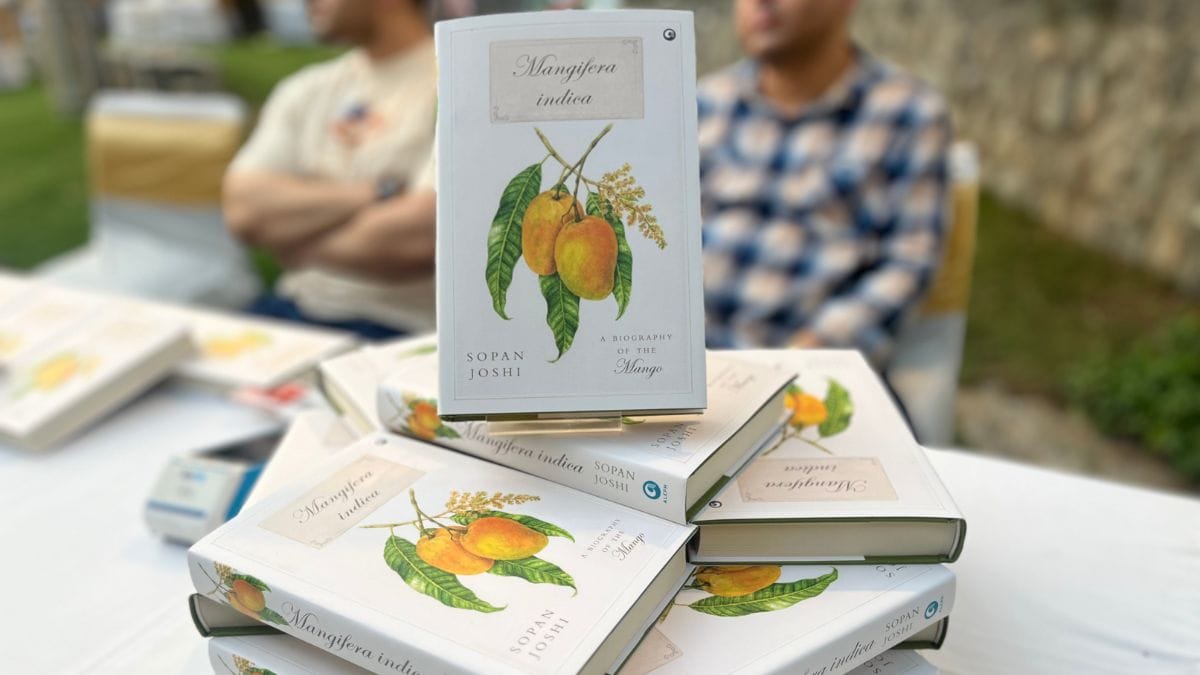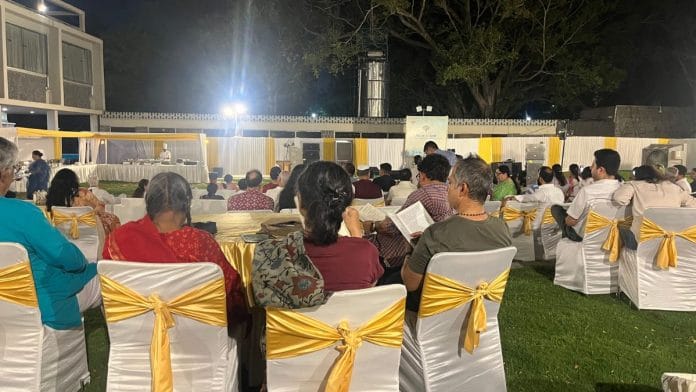New Delhi: Everyone has a mango story — even Ghalib and Buddha. And only the love for mangoes can explain people sitting in 40 degrees heat for three hours on a Saturday evening, at Delhi’s India International Centre.
A little to learn, a lot to listen, and plenty to love. But just like mango, some parts of the event went a little sour. The Dastangoi, a performance on mangoes of India, went on for over an hour, delaying the talk. In a crowd of nearly 100 people, many found the recitation dense. Though few laughed. At Bazm-e-Aam, the discussion on mangoes — the anticipated part of the event — didn’t last for more than 24 minutes. And that didn’t go unnoticed by the attendees.
The Dastangoi titled Dastaan-e-Amba, performed by Ashhar Haque, was filled with history, wit, and poetry. He mentioned mango’s journey through every era — from Ghalib to Mughal memories and folk tales. However, many attendees, who were already familiar with these stories, were looking for more depth and context. There were moments of humour and shayari that drew laughter from a few tables.
“Jannat humein qubool hai magar ek shart par, Aam ki kalam ka hissa humare saath jaye,” Ashhar told this sher in his dastan. (I accept heaven, but I want to bring mangoes with me)
The event was organised by Kashkol Collective, a Delhi-based group that promotes art and culture. There was music, poetry and a five-course meal prepared with mango. Each dish represented a different state. And people eagerly waited for it. At the beginning of the event, people were served aam panna.
The gathering also featured stories from Mangifera Indica: A Biography of the Mango, a book by Sopan Joshi that traces the fruit’s rich cultural and ecological history. It was released last year.

After the Dastaan-e-Amba, a panel discussion on ‘the cultural life of the Mango’ had historian Sohail Hashmi and environmentalist and author Sopan Joshi discuss the cultural and historical aspects of the fruit. In the 24-minute conversation, they merged personal memory and cultural legacy.
“When we talk about mango, people start narrating their childhood stories about it. Before two to three generations, the Aamrai (mango garden) used to be their infrastructure. Barat used to come there, Kushti used to be played there and even lovers used to meet there. That is the reason why people talk so passionately about mango,” said Sopan Joshi.
Also read: Stop this North-South divide over mangoes. The real match is playing out in Bihar and Bengal
Veg mango, non-veg mango
Hashmi pointed out the limited exposure of Delhi people when it came to different mango varieties.
“Generally, people in Delhi are familiar with only four types of mangoes — safeda, langda, chausa, and dasheri. Most Delhiites don’t know about varieties like rataul, saroli, or gola khimuddin. I started taking people on bus trips so they could learn about these mangoes and taste them. Through these trips, my bond with mangoes grew deeper. Once Sopan accompanied me, and he told me that he wanted to write a book on mangoes. This book is the result of that,” said Sohail Hashmi.
He went on to recite a nazm describing the glory of mangoes:
“Jo aam mein hai wo lab-e-sheerin mein nahi,
Ras, reshon mein hain jo Sheikh ki daadhi se muqaddas.
Aate hain nazar aam, to jaate hain badan kas,
Langde bhi chale jaate hain, khane ko Banaras.”
The heat and the event’s management left a few participants frustrated.
“I paid Rs 4,000 for this event, but it wasn’t worth it. The first part got stretched. I liked the discussion, but it was too short. The heat wasn’t helping at all. This event really tested my patience, but you learn from such things,” said Sapna, one of the attendees.
A musical session that had ragas and folk songs performed by the group Dholak Rani, led by vocalist Shivangini Yeashu Yuvraj, marked the end of the event. It had regional folk songs that mention mangoes. Even as the artists performed, the attendees, by now well past their dinner time, moved to the buffet area. It was a bouquet of mango dishes from various parts of India.
Aam kucha (shredded raw mango chutney) from Bihar, a mango and mutton keema dish called achraj from Lucknow. Some other dishes included aam kathal ki sabji from Bihar, a chutney and salad from Manipur and a Gujarati-Parsi dish ras-no-fajeto, and aam ki kheer from Rajasthan.
However, the organisers didn’t segregate the vegetarian and the non-vegetarian cuisines. As people indulged in the dishes, the announcer made an urgent call: “Achraj ek non-veg dish hai. Vegetarians isey naa khaaein.” Vegetarians, don’t eat achraj. It’s a non-veg dish.
(Edited by Ratan Priya)







How did it turn a sour affair. The headline shouts so, but the story doesn’t justify it.